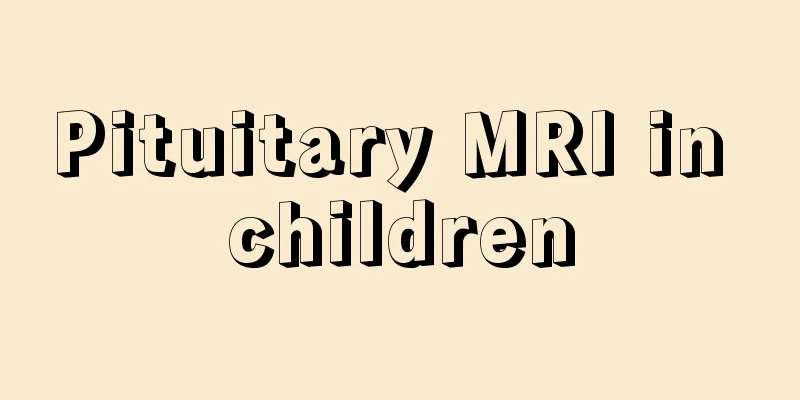Newborns don't like drinking water, right?

|
Many parents always encounter various problems in the process of taking care of their babies, especially for newborn babies. Many inexperienced parents are always at a loss. What’s more, babies cannot express their needs through words. Babies need to obtain the nutritional value needed by the body through breast milk or formula every day. However, many parents will find that their babies do not like to drink water in the process of taking care of their babies. Many parents are afraid that this phenomenon will cause dry throat or constipation, so they will be particularly worried. Let’s find out if it is normal for newborns to not like to drink water. It is normal for newborns not to like drinking water As long as you sweat or pee normally, you're fine! At first glance it may seem a bit exaggerated. Drinking water is the most common thing in life. Is there anyone who doesn’t know how to drink water? Little do people know that babies are a special group and need careful care from their parents, even when it comes to drinking water. Water is a macronutrient that is second only to oxygen in sustaining life and is more important than food. People can survive for weeks or even months without food, but will die without water for a few days. In addition to transporting nutrients between the body's tissues and organs and excreting waste, water also plays a role in It also has other physiological functions such as ① participating in the entire metabolic process; ② regulating body temperature; ③ maintaining blood volume; ④ maintaining normal gland secretion, etc. Because water accounts for 70% to 80% of the body weight of infants and young children, and 60% of that of adults, water is more important for infants and young children than for adults. Usually, special attention should be paid to replenishing water for infants and young children in time (mainly drinking water). Here are a few questions about how to give water to infants and young children. 1. What kind of baby wants to drink water? Most infants and young children cannot tell you when they are thirsty, so it is up to the mother or other caregiver to observe. If the baby keeps licking his lips, or his lips are dry, or he does not urinate when the diaper should be changed, these are reminders that the baby needs to drink water. 2. What kind of water is the healthiest? Unsweetened plain water is best. Because babies drink sweetened water (beverages), they will not be willing to drink breast milk after a long time, which is not good for their growth and development. In particular, do not give your baby various artificially prepared beverages, because these beverages contain artificial additives that can irritate the baby's gastrointestinal tract, causing discomfort and hindering digestion at the mildest, and causing convulsions at the worst. 3. When should you drink water? In addition to the above symptoms of needing to drink water. Generally, you need to give your baby water between feedings, after spending a long time outside, after taking a bath, after waking up, and before going to bed at night. However, you must be careful not to give him water before feeding to avoid affecting feeding. 4. How much water should you drink in a day? There are many factors that affect the body's water needs, such as age, room temperature, humidity, activity level, body temperature, and water content in milk or food. Generally speaking, in the neonatal period, since breastfeeding is frequent, if the milk supply is sufficient, feeding 1 to 2 times a day is sufficient. As age increases, the number of watering times and the amount of water each time should increase. But in reality, how much water the baby drinks depends on his own wishes. In other words, if he doesn’t want to drink it after you feed him, then forget it. This means that the baby has enough water in his body. The above is an introduction to whether it is normal for newborns to not like drinking water. After understanding it, we know that it is normal for newborns to not like drinking water due to their relatively low amount of exercise. As long as the baby's urination and sweating are normal, it will be fine. In addition, the main ingredient of breast milk or milk powder that newborns eat every day is water, so many parents do not need to worry when encountering such problems, but they must observe the baby's urination and sweating. |
<<: What to do if your two-year-old baby has leg pain
>>: What to do if the redness and swelling after vaccination
Recommend
What to do about separation anxiety in children?
What causes separation anxiety in children? Nowad...
The child always blinks hard
Our eyes blink every few seconds, which is a norm...
Coffee spots on seven month old baby
Babies are most likely to have some minor physica...
Causes and treatment of decreased appetite in newborns
There are many reasons for the decreased appetite...
What should I do if my two and a half year old baby has a bad stomach?
The problem of a two-and-a-half-year-old baby hav...
Why does my child blink frequently?
Children's health is a matter of concern for ...
What to do if your baby drinks water but not milk
There are many babies who like to drink water but...
What can children eat to make their skin whiter?
Skin problems not only affect adults, but also ch...
Uneven skin tone on children's faces
Children generally have weaker body resistance an...
Introduction to family rehabilitation training methods for children with cerebral palsy
Cerebral palsy in children can cause great harm t...
What are the benefits of children learning to swim?
In daily life, many children like to play with wa...
How to treat abdominal pain in newborns?
Newborn babies must remember not to eat random fo...
Babies who eat too much sweets tend to be withdrawn
Sweets are the food that many people, especially ...
Signs that your baby will talk
For a new mother, the biggest surprise is when he...
What to do if your child has stomach problems
Nowadays, many children suffer from stomach probl...









